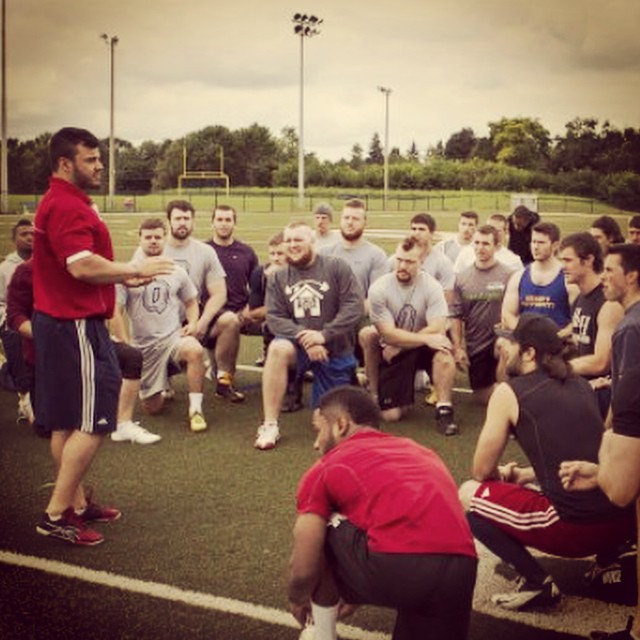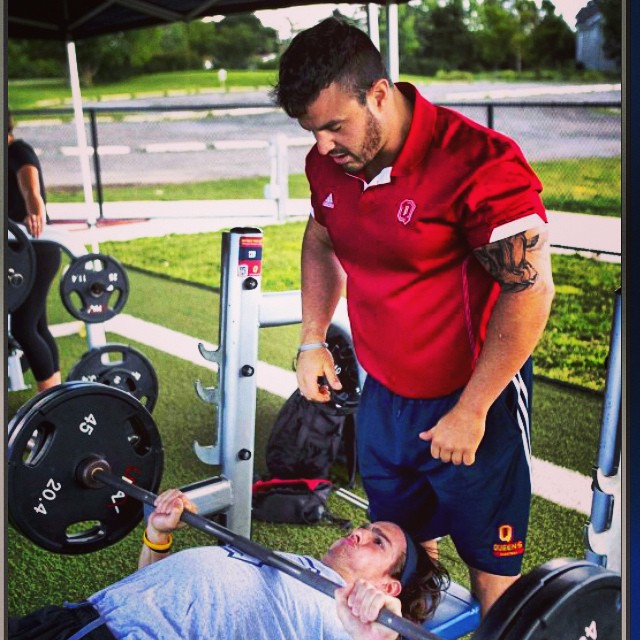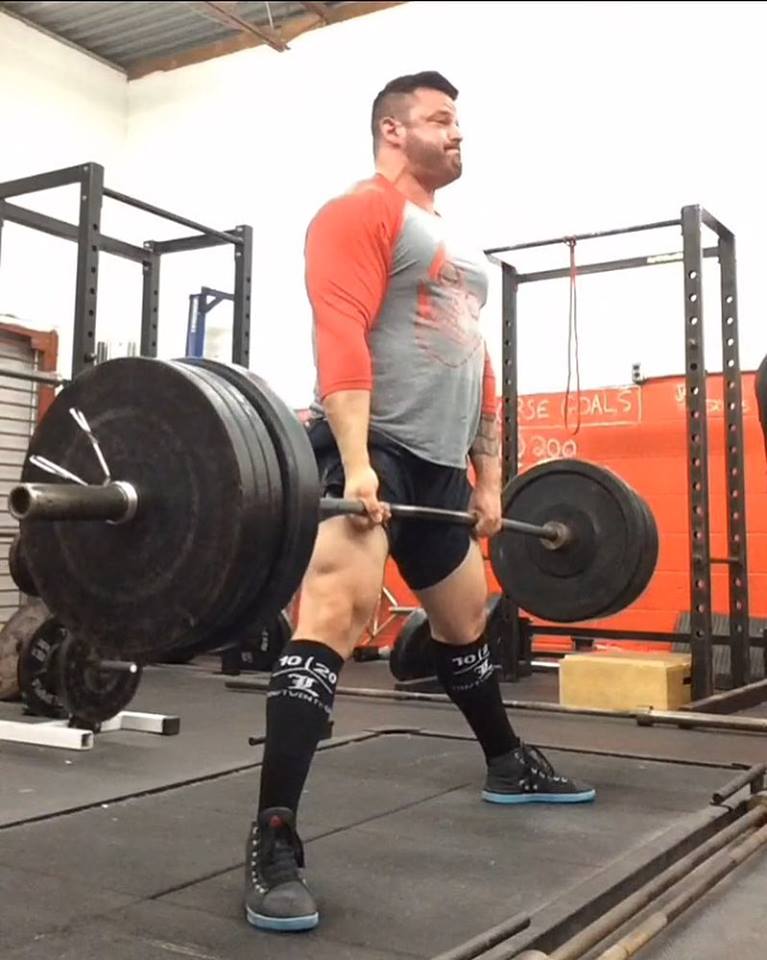
16 Apr Tales of a Washed Up Strength Coach – You’re Clueless, Guy!
By Paul Oneid
Unless you have been a collegiate strength coach, are best friends with one, or are married to one, you have no idea what the job truly entails. I love the Internet. I spend my day working on it, run my coaching business off of it and do a few Google searches from time to time. My beef with the Internet is that it provides people with a platform to run off at the mouth with their opinions on things they know absolutely nothing about. A quick scroll through my Facebook feed lets me know everyday that 50+ of my “friends” could be better strength coaches than Joe Kenn because they have their NASM certification and read Bondarchuk for pleasure. Well, I am here to tell you that you’re clueless, guy! You can spout off about force/ velocity relationships, metabolic pathways, energy systems, motor unit recruitment, bioneuro feedback, auto regulation and thermo nuclear dynamics all you want, but until you have been in that room, working with those athletes, consulting with those sport coaches, you have NO opinion. None.
“Oh, did you see that YouTube video of the University of ******* doing Olympic lifts? Man, their technique is terrible! If I was there, the first thing I would do is clean that up.” – Nope, you wouldn’t.
“You know, if I was an NBA strength coach, I would really put a lot of effort into getting these guys stronger. They need to be lifting more and then they would get faster. I know exactly what I would do.” – Stop. Just don’t.
[wa-wps]
These are just a few small examples of the things you see on the web. Truth of the matter is, they are both not wrong. There is a lot of poor technique and it would serve the athletes well to focus on improving it. NBA players would benefit from some more max strength. Unfortunately, given the circumstances, those things just won’t happen for various reasons. A lot of considerations need to be made when you are the Head Strength and Conditioning Coach at any level. You can’t always do what you want, or what you think is best. You’re bound to your circumstances. Those who succeed are the ones who are able to do the best with what they have, where they are. Here are just 5 of the things that many people don’t even consider when giving their Internet advices:
Equipment
The first consideration from a programming perspective you must make is based on what equipment you have at your disposal. If you don’t have turf or a suitable surface in the weight room, you’re not going to be doing prowler sprints in between your sets of squats. You can argue and say, “Well, just order the equipment you need,” or “educate your coach on what is required for optimal sport preparation.” The fact of the matter is that you have a budget, especially non-BCS schools, and that budget is laughable. You can’t buy want you want, and in most cases you have to beg and plead to buy what you need. You have to improvise and adapt to overcome the obstacles. If you don’t like your situation, quit. You’ll have a hard time finding a job without obstacles and there is always someone willing to do the same job, work more hours and get paid less than you.
Time and Human Resources
The amount of time you have to devote to training your athlete is going to be highly variable based on the coach, team, sport and resources. If you only have 2 hours a week, how will you use it to your advantage? Everything about your program will be influenced by time. If you have an entire football team to train and no assistant coaches, how will you manage the athletes within the room for safety? How will you coach technique? How do you organize the room so you can see everyone? These are all important factors that must be thought of when designing a training program.
Coaches’ Expectations
You are working for the sport coach to prepare the athlete for competition. Your job is to optimize their performance and reduce the rate of injury, so that the athlete can be available to the coach when they’re called upon. How do you quantify that? You can test maxes, measure speeds, jumps, body composition, review data and identify trends, but at the end of the day it is the sport coach who determines what measurable factors are most important. If they don’t want you to squat the athletes, you don’t. If the coach wants Olympic lifts in their program, you program Olympic lifting. You know why? Because you want to keep your job! Yes, again, you can educate your coach about new research, best practices and anything you deem necessary to advocate for your position, but the coach is your boss. They make the rules. Make the most of what you have where you are at and find a way to stay true to your philosophy within the constraints of your situation. No job is perfect and very very few (if any) coaches have “Carte Blanche” to train the athletes the way they want to.
Training Age/ Sport Level
You aren’t going to train a freshman female lacrosse player the same as LeBron James. That being said, could both benefit from some general strength training? Absolutely! The approach you take is going to be the difference. LeBron is LeBron for a reason. He is going to be successful regardless of the way he trains. If you have ever watched videos of him training, that will become glaringly apparent. You know what, though? You absolutely CAN mess him up! When you’re given a Ferrari to take care of, you DO NOT break it. That is your number one priority. The focus for that strength coach is injury prevention and making sure he feels the way he needs to in order to perform. If LeBron likes running against bands and doing pushups, then you make sure he does that in the safest way possible. That is the nature of professional sports. There is absolutely a more beneficial way for him to train, but at the end of the day he is worth millions and millions of dollars.
The System/ School
The Oregon Ducks’ run and gun offense will need to train differently than the Nebraska Cornhuskers’ heavy hits in a cloud of dust offense. Different systems require different preparation. That is why school’s recruit different styles of players and that is why certain pro teams will draft players from certain schools. Certain positions need to train a little bit differently than others and the same position on a different team will require different preparation. That is an example using football, but it parallels all other sports. You’ll also need to adjust for the school you’re at. The school will influence the resources and the time, which tie back into points 1 and 2. If you don’t have the space, staff, or time to accommodate the different training styles within the same team, you’re not going to do it. What if your coach wants you to (#3)? You better find a way, or find a new job.
Get your 10/20/Life deadlift socks here!
I bet that you wouldn’t have thought of most of these factors from the ergonomic chair in your mother’s basement, but this is the life of a strength coach. You don’t know what they go through on a daily basis and the obstacles they need to overcome. All of these considerations influence one another and they are influence the way a strength coach writes a program and runs/ assists in running the department. Take a step off that high horse and quit preaching your regurgitated Mel Siff quotes. Nobody who matters cares because you’re clueless, guy!”
Paul Oneid
Latest posts by Paul Oneid (see all)
- A Proposition for a Paradigm of Planning Your Personal Periodization - March 4, 2019
- Paul Oneid –> Off-Season | Feet Up Bench PR and Some Squats - March 1, 2019
- Paul Oneid –> Off-Season | A bit of everything - February 21, 2019








Sorry, the comment form is closed at this time.